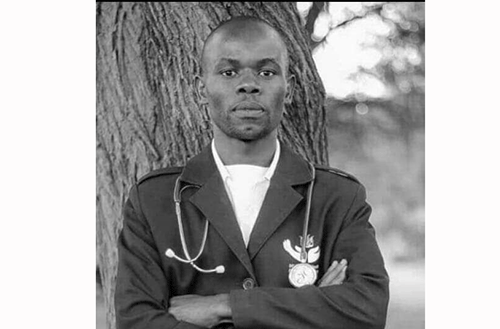Lahja Nashuuta
Alfeus Lungameni Hamundja is a committed and qualified registered nurse who is steadfast in implementing nursing care for Tuberculosis (TB) patients, and provides interventions, treatments and therapies to those in need.
Alongside others, Hamundja lit the nursing lamp in Otjiwarongo Regional Training Centre in 2019 during his graduation ceremony with an oath and symbolic commitment to care for and comfort those who are suffering.
The latter is one of the few male nurses to have found a niche for himself in the female-dominated field and this position, he says, fits him like a glove.
Born and bred in Ohamwaala village in Ohangwena region’s Oshikango constituency, Hamundja joined the public service in August 2019 as an enrolled midwife nurse at Epinga clinic in the Eenhana district. He was 23 years old by then. Hamundja was later transferred to Outapi district in the Omusati region for the position of a TB focal nurse.
“Working for the government was my dream, as I always wanted to work in a profession that was versatile, unpredictable and full of diverse challenges. Nursing fulfilled these desires. It is not just a profession, but a life calling, with so much professional and personal potential,” he said.
He, however, admits that the title of nurse comes with a lot of responsibilities.
“If you wish to take up a calling in nursing, you need to be selfless, passionate about health, and love people,” he said.
Hamundja is responsible for coordinating activities within the hospital, including service delivery, improving case finding and facilitating linkage to care at primary healthcare centres, hospitals and decentralised drug-resistant TB sites.
“Over the years, I grew a passion for caring for patients with deep respect and humility. For me, the most satisfying thing about nursing is being able to treat the patient who was ill, and becomes healed and healthy again,” he said.
Asked why he opted for civil service, Hamundja had this to say: “Joining government was the patriotic thing to do. Also, our parents at that time motivated us to join the civil workforce as that was seen as one of the greatest contributions to nation-building.”
Since his first day at work, he has never wished for a better employer, he said.
Hamundja said while working in the civil service can be rewarding, it also comes with its own challenges “as people have different expectations from government ministries and agencies.”
He, however, asserts that whatever challenges he might encounter in his role, it is justified by the job security and perks that come with all government jobs.
“When you work for the government, your job is secure. It all boils down to how serious you are with your work. Furthermore, there are a lot of benefits such as medical aid, which is affordable,” said the civil servant.
There are also various opportunities for growth in civil service, he continued.
Growth and achievements
Hamundja furthermore revealed that his role as a nurse over the years exposed him to an array of responsibilities, which in turn fortified his career aspirations.
“For the past years, I have been trained in more than 60 workshops/trainings such as HIV testing, TB infection prevention and control, Essential Programme on Immunisation, ART Guideline, Malaria as well as Hepatitis B prevention and control, to mention but a few,” he said.
He marvels at the memory that, while working at Epinga clinic, “I had served that clinic alone as a nurse for consecutive months, due to the fact that my nurse in charge went on maternity leave, and the other nurse went to Eenhana State Hospital. In fact, even my PHC supervisor was on maternity leave, so it was not easy, but I managed to serve the clinic.”
Queried on what he believes sets civil servants apart from employees in other sectors of the economy, Hamundja could only sing their praises.
“The work ethic among civil servants varies from ministry to ministry. I don’t believe that all civil servants are lazy and largely ineffective. The truth is that the government had limited resources, and received an influx of people to be served daily. I know government employees who are very effective and very dedicated to the fact that 85% depend on public health,” he boasted.
– lnashuuta@gmail.com


